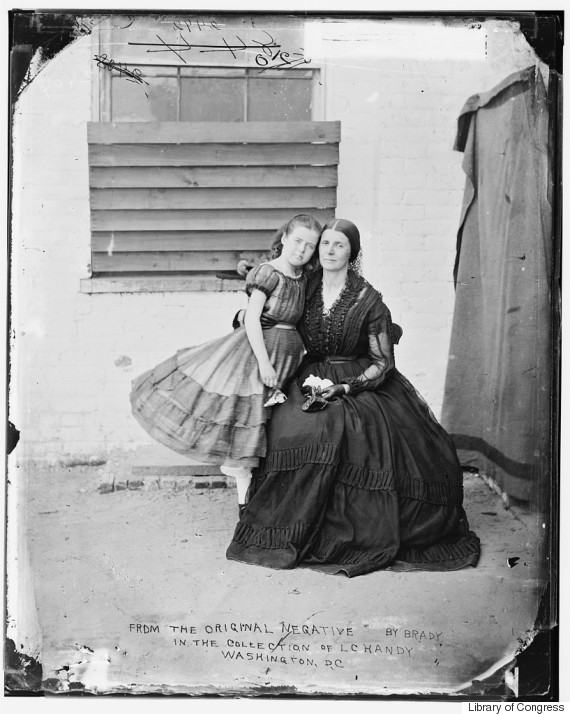In her recent New York magazine essay, Rebecca Traister examines the rising power of single women, "the most potent political force in America." The percentage of married adult women dropped below 50 percent for the first time in 2009, as younger women delay marriage and older ones divorce. In 2012, single women made up nearly one-quarter of the electorate.
Single women have the potential, Traister writes, to unleash a social and political revolution "as profound as the invention of birth control, as the sexual revolution, as the abolition of slavery, as women's suffrage..."
But this isn't the first time single women have altered history. It's just in many cases, their exploits have been erased from the record, says historian Karen Abbott, author of Liar, Temptress, Soldier, Spy: Four Women Undercover in the Civil War, recently released in paperback. "I don't understand why these Civil War women weren't in history books -- they played such vital roles," says Abbott.
Abbott profiles two Union supporters -- Emma Edmonds, who disguised herself as a man and fought in battle; and Elizabeth Van Lew, a wealthy Virginian who ran a Union spy ring in the Confederate capital of Richmond and was credited by Ulysses S. Grant with helping to win the war. The two Confederates of the title are Belle Boyd, a narcissistic 17-year-old who shot a Union soldier in her Shenandoah Valley home and goes on to spy for the south; and Rose O'Neal Greenhow, a 40-something widow and socialite in Washington D.C. who seduced secrets out of northern politicians and was recognized by Jefferson Davis for securing victory at the First Battle of Bull Run. (Edmonds and Boyd eventually marry after their adventures in the war.)
Abbott, who's been called the "pioneer of sizzle history," by USA Today, draws from the historical record to tell the women's stories. All of their quotes come directly from diaries, memoirs, letters, court transcripts and other archival material. "The truth is more interesting than fiction in a lot of ways," Abbott notes. "Belle Boyd wrote a letter to her cousin extolling her physical virtues, [writing] 'my foot in perfect.' If someone tried to write that in a novel, it would be cut. One of Belle's paramours was a man by the name of Major Dick Long. That's one of the joys of nonfiction -- I could never get away with making that up."
And the women in "Liar, Temptress, Soldier, Spy" do make for a suspenseful narrative. In a "Victor/Victoria" moment, Edmonds goes undercover as an Irish peddler to cross Confederate lines -- a woman disguised as a man, disguised as a woman. Van Lew not only organizes an extensive spy ring, she breaks Union soldiers out of prison, hides them in her attic and smuggles them to the north. In one scene, Boyd dashes across a field of battle, dodging bullets to deliver a dispatch to General Stonewall Jackson. And Greenhow, after negotiating her way out of a northern prison, sails to Europe to garner diplomatic support for the south.
Throughout the narrative, the spies exploit stereotypes of women to their advantage. "Gender was used as both a physical and psychological disguise," Abbott notes. "Physically, they're hiding evidence and dispatches up in their hair and under their hoop skirts and tied to their crinoline. Psychologically, whenever these women were accused of treasonous activity, the standard response was 'how dare you, I'm a defenseless woman!' At the time it was pretty effective -- the standard answer to that was, 'oh, I'm so sorry ma'am, of course.' But these women were anything but defenseless."
A fifth spy profiled in the book, Mary Jane Bowser, was a former family slave working for the Van Lews. Elizabeth, an abolitionist, defied her father's wishes and freed the family's slaves as soon as he died, and sent young Mary Jane to school in the north. When Confederate President Jefferson Davis and his wife Varina needed help setting up their home in Richmond, Elizabeth recommended Mary Jane.
"Little does anybody know that Mary Jane is not only literate, but highly educated and gifted with a photographic memory," Abbott said. "So while she is dusting Jefferson Davis' desk, she is also sneaking a peek at his confidential papers and eavesdropping on conversations and reporting all of this back to Elizabeth." Abbott said she did not give Bowser top billing as the fifth spy because she couldn't find enough archival material to write scenes from Bowser's point of view.
And while it's easy to admire the characters' intelligence and moxie, Abbott doesn't shy away from describing their flaws as well. The racist views of Greenhow and Boyd are deeply painful to read. "It's something that I really struggled with," Abbott says. "Rose in particular had some abhorrent views. But the whole point of history is to lay it out, warts and all -- to put the characters out there as they behaved and [let] people come away with the judgments."
Abbott's previous books profiled Vaudeville stripper Gypsy Rose Lee and Minna and Ada Everleigh, who ran a legendary Chicago brothel at the turn of the 20th century (and whose phrase "getting Everleighed" is purportedly the origin of the modern idiom "getting laid.")
"I've always been drawn to the darker side of people and things," says Abbott, who recently sold her next book, the story of a 1920s bootlegger and the revolutionary female district attorney who brought him down. "I often prefer my protagonists to be unlikeable - complicated, flawed, terrible women who do terrible things. Men have been allowed to be terrible and flawed for centuries -- women should be allowed to be terrible and flawed and still be considered relevant."
Karen Abbott will speak at the Des Moines Public Library on March 1 at 7 p.m.

Earlier on Huff/Post50:

